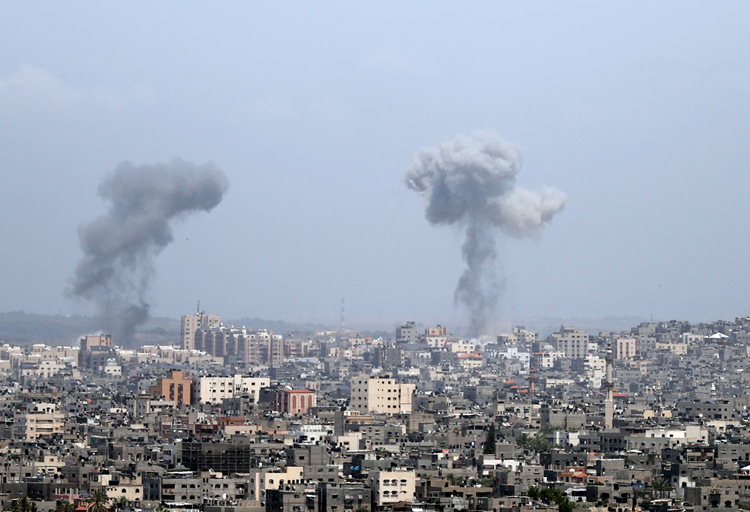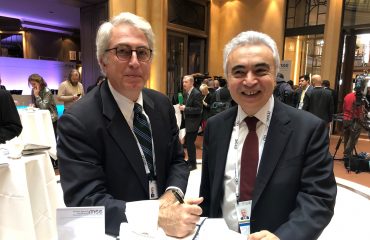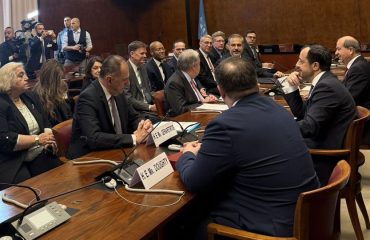

Hamas and Israel agreed on a 4-day ceasefire, hostage swap and humanitarian aid delivery which was reportedly brokered by Qatar and Egypt. Türkiye has not been mentioned in statements. (Photo: Mustafa Hassona – AA)
A 4-day ceasefire, hostage exchange, and humanitarian aid delivery agreement between Israel and Hamas in Gaza have been announced in the first hours of November 22.
Israel and Hamas agreed on a “humanitarian pause” to the crisis that started on October 7 when Hamas attacked Israel and killed 1,200 people, mostly civilians, and has continued for 45 days since then as Israel rained fire on Gaza, killing 13,000 people, mostly civilians.
Israel agreed to allow hundreds of trucks of humanitarian aid, including those sent by Türkiye, to enter Gaza under Egyptian control for four days. During the same period, 50 Israeli and 150 Palestinian hostages, including women and children, are to be mutually released. Both sides emphasize that the ceasefire does not mean an end to hostilities.
Hamas leader Ismail Haniyeh announced on November 21 that they were very close to an agreement and were talking to Israel through Qatar; Egypt was also involved. The American news site Politico reported that since US President Joe Biden’s call to Qatar’s Sheikh al-Tamim on November 17, National Security Advisor Jake Sullivan’s deputy, Brett McGurk, has been shuttling between Doha, Cairo and Jerusalem to support the mediation.
Israel, Hamas, and the United States were the first to thank Egypt and Qatar for their contribution to the ceasefire, albeit temporarily. They did not give credit to Türkiye.
Ceasefire negotiations: The Turkish public is not being told the truth
In Algiers on November 21, as a guest of President Abdel Majid Tabboun, Turkish President Tayyip Erdoğan said that Türkiye’s priority was to achieve a ceasefire in Gaza to “prevent genocide” and to deliver humanitarian aid to the Palestinians, adding that negotiations on the return of hostages were ongoing.
On November 4, on his way back from Kazakhstan, Erdoğan announced that Ibrahim Kalın, the head of the Turkish National Intelligence Organization (MİT), had met with both Israelis and the Palestinians, including Hamas, on these issues. I am sure that MİT had some contribution, but Hamas says that the ceasefire and hostage swap with Israel – albeit temporary – was achieved through dialog with Qatar and Egypt, and does not mention Türkiye.
When Erdoğan told German President Frank-Walter Steinmeier and Chancellor Olaf Scholtz on November 17, “Germany should convince Israel and we should convince Hamas,” I wrote that he spoke as if he was taken Hamas granted. It seems that Hamas trusts Qatar and Egypt.
There are other issues where the government is not telling the public the truth about Gaza.
Who blocked the embargo on Israel?
For example, at the joint summit of the Organization of the Islamic Conference and the Arab League in Riyadh on November 11, a proposal by 11 Arab countries to impose an embargo on Israel, including the use of the oil weapon, was rejected by 4 Arab countries: Saudi Arabia, UAE, Bahrain, and Morocco. This did not find much coverage in the government-led media. But even if this decision had been taken, it would not have been worth the paper it was written on. No wonder Israel did not find the Riyadh Summit a deterrent.
Naturally, it was news that Türkiye was included in the Foreign Ministers’ committee to follow up and implement the decisions taken at the Riyadh Summit. However, the absence of the Turkish delegation from the visit of Chinese Foreign Minister Wangi Yi on November 20, which was the first action of this committee, alongside the delegations of the State of Palestine, Saudi Arabia, Egypt, Jordan, Indonesia and Jordan, was not highlighted in the mainstream Turkish media.
Turkish Foreign Minister Hakan Fidan was at the hearing of his Ministry’s 2024 budget in the Parliament on the same day, which is how he explained his absence; but one of the four deputy ministers could have been present in Beijing. On November 21, when the same delegation visited Russian Foreign Minister Sergey Lavrov in Moscow, Fidan accompanied Erdoğan in Algiers.
Ceasefire, US, and Türkiye
However, it was announced that Fidan will take part in a delegation of Islamic countries traveling to London and Paris today, November 22. Maybe this will be newsworthy for the mainstream Turkish media.
Those four countries are on the visit list of the joint Islamic committee because China, Russia, the UK, and France are four permanent members of the UN Security Council, alongside the US. No official announcement has yet been made that the delegation of Islamic countries will go to the US and meet with Secretary of State Antony Blinken, nor whether Fidan will attend if this trip takes place.
Why did Hamas entrust Qatar and Egypt in dialog with Israel, when the Turkish leader Erdoğan is the most open supporter of Hamas? Could it be because Qatar and Egypt continue to maintain dialog with Israel despite everything? There is the example of Turkish Health Minister Fahrettin Koca enabling the transfer of Palestinian patients to Türkiye through dialog with Israeli Health Minister Moshe Arbel.
To reconcile two people who are at odds with each other, let alone in political relations, you need someone comfortable talking to both.
U-turns of Erdoğan’s diplomacy
Erdoğan has difficulties establishing a result-oriented dialog with Israel, which he has declared “genocidal” and “terrorist”, at least not yet. Moreover, he met with Israeli Prime Minister Binyamin Netanyahu, whom he previously said he would “never” meet, for the sake of the economic crisis, and now he says “never again”. On December 7, he is going to visit Greek Prime Minister Kyriakos Mitsotakis, with whom he previously said he would never meet. (I do not want to be misunderstood, I am not questioning why Erdoğan is going to Greece; I am not in favor of war and tension.)
Erdoğan, cut Egypt-Türkiye relations by calling Abdel Fattah Sisi “a dictator,” since Sisi overthrew President Mohamed Morsi of the Muslim Brotherhood in Egypt in 2013, and made peace with him in 2022 thanks to the efforts of the Emir of Qatar, Sheikh Tamim. Because the Sheikh had a dialog with both Erdoğan and Sisi.
The tally of these U-turns of Erdoğan’s diplomacy is being kept in the capitals of the world. Unfortunately, not every hard line of the Turkish President brings results. But conciliatory outbursts, such as Russia’s in the Ukraine war, do.
Erdoğan and his team should learn from the Turkish proverb “sharp vinegar hurts the pot” – it is Türkiye that suffers.

